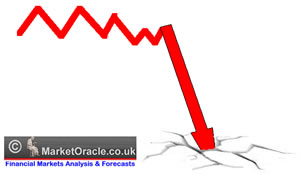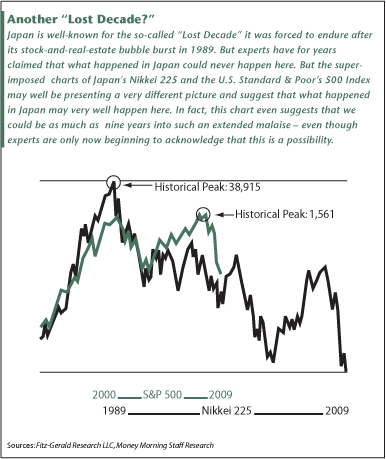Economic Depression: Anatomy of a Lost Decade
Economics / Great Depression II May 27, 2009 - 05:04 PM GMTBy: Money_Morning
 Keith Fitz-Gerald writes: If you want a real look at what's headed this way, ask Hideko Toyotomi.
Keith Fitz-Gerald writes: If you want a real look at what's headed this way, ask Hideko Toyotomi.
When Japan's so-called "Lost Decade" began with a bang in the early 1990s, she was an "OL" - an office lady - working in one of Japan's mightiest corporations and she kept her job, despite the downturn.
 She was one of the lucky ones. Her employer was a mainstay electronics producer and a key exporter, meaning the company's business remained reasonably healthy.
She was one of the lucky ones. Her employer was a mainstay electronics producer and a key exporter, meaning the company's business remained reasonably healthy.
This time around, she's a housewife and mother. And she's worried. Her husband, Masao, works at a local manufacturer that's cut back production to only four days a week. He's taken a part-time job, schlepping boxes overnight at the local convenience store, to make up for the reduced pay. Their son, Daiki, is headed for college - and for an uncertain future.
"I don't know if I have the strength to go through this again," she said. "This time, it's worse," noting that Japan never really recovered from its "Lost Decade."
Anatomy of a Lost Decade
Having spent a substantial amount of time in Japan over the past 20 years, I agree and I'm struck with a tremendously foreboding sense of déjà vu that I just can't shake no matter how hard I try.
What happened in Japan is being replayed in the United States - in exquisite detail, and with a bit of agony, too. Since 2001, I've been warning anyone who would listen that the Japanese experience was only a precursor to what we could experience here.
Naturally, that's been a controversial view, particularly since it's virtually unthinkable for an entire generation of politicians and financiers who thought they "knew better" and that it could never happen to us.
But lately, it's not so unthinkable. In fact, if I were to take the names out of the Japanese experience, the story could easily be the one that's unfolding now.
In the late 1980s, Japanese companies ran the planet. A strong currency, solid work ethic and close government connections created an unstoppable growth machine - referred to by the U.S. media as the "Japanese juggernaut," or the "Japanese Superman."
In the interest of additional growth and financial modernization, Japan deregulated its financial markets and began lowering interest rates. Not surprisingly, the Nikkei 225 stock index more than tripled in less than five years, companies blossomed and the use of debt skyrocketed.
Sound familiar?
Then all hell broke loose.
At the same time, real estate values began to waver, the government figured out that the entire Japanese financial system was a house of cards leveraged against collateral that didn't exist and that wasn't properly valued in the first place. And the Nikkei has collapsed to where it stands today - at one-fifth the value it had attained in 1989.
Once-stalwart companies began defaulting on loans and many went out of business entirely. Individuals couldn't repay their debts. Real estate values fell dramatically and today remain as much as 50% below their 1989 peak. People simply turned over the keys to their homes to the banks or, like the family immediately behind our house in Kyoto, simply disappeared in the middle of the night, never to be seen again.
Unemployment rose to an unthinkable 5.5%. Suicides soared. And homeless camps, which Japan had never seen before in the post-war era, go-go years, dotted the banks of the rivers that wind their way through major cities like Tokyo and Osaka. In our neighborhood, the Kyoto city government built a brand new bathroom building for the children's playground only to watch as a troop of six homeless men moved in - and refused to leave for the next four years. We also watched ubiquitous, blue-tarped "houses" appear under each bridge spanning the scenic Kamo River.
They disappeared when Japan's economy improved in the late 1990s, or early this decade. They're back now.
Making matters far worse, at the same time all of this was happening, deflation set in with a vengeance and brought matters full circle. Lower prices meant lower margins. Lower margins meant lower production and the need for lower production, in turn, created the need for smaller work forces.
Fast forward to today.
A Painful Replay
This same downward spiral that played out in Japan in the early 1990s seems to have taken hold here in the United States. Economists called this "excess" capacity and said that a short period of readjustment would be followed by new growth. But instead, they've gotten just more misery punctuated by a few fits and starts of economic recovery. And the resultant record job cuts hardly point to an imminent turnaround.
Even so, many people here in the United States remain in denial. They simply cannot accept that what happened in Japan appears to be replaying itself out here. They reason that our government is taking more aggressive action than the Japanese government did, that our corporations are better managed, that somehow they'll pull through based on demand and, my personal favorite, that our bubble simply wasn't the same as Japan's.
They're right ... it's worse.

According to a report in the Global Mail, in 1989 the Japanese economy needed a mere three yen of credit to make one yen of national income. Here in the United States, we've needed $8 dollars of credit for every $1 dollar of national income. And we may need more. In Japan, the "bubble" grew for only a few relatively intense years from 1985-1991. Here in the United States, it's been allowed to fester for 30 years.
When the Japan's bubble broke, it was a creditor nation, which means, overall, there was more money flowing into Japan than out. At the time, Japan had $1 billion surplus on any given day.
When the U.S. financial crisis started, this country was running a $2 trillion deficit, meaning we've spent that much more than we earn as a nation. Now, factoring in the stimulus plans and all sorts of bailouts, we're arguably approaching $14 trillion.
In 1990, the Japanese were saving 17% of their income. At the moment, Americans have practically no savings to fall back upon and our savings rate has, in fact, gone negative several times in recent years (however, some reports indicate that U.S. savings rates have risen in recent months).
But what really makes me stop and think twice is this: At the time Japan's bubble burst, the island nation still had extensive trade with its partners, and consumers around the world were spending. So there was a cushion. This time around, spending has ground to a halt and there literally is no safety buffer.
Just last week, in fact, Money Morning reported that Japan's exports were cut nearly in half last month as the global downturn crushed demand for the country's electronics and automobiles, a development that increases the odds that the Japanese yen could be poised for a tumble.
That, more than any reason is why the U.S. government - right or wrong - has stepped in to become the risk taker of last resort.
While that may actually be a good thing from the standpoint of intent, it hasn't been great from an execution standpoint.
In as much as the U.S. stimulus programs being enacted by central bankers around the world will eventually take hold, that suggests that investors should continue to invest - albeit super selectively - throughout this mess in a couple of areas:
- Bond markets are especially overbought and I can't think of more spectacular profit potential particularly at the long end of the spectrum. The U.S. government may borrow as much as $3 trillion dollars in 2009 alone, and it's likely rising rates are not far behind.
- The Japanese yen itself seems ripe for a fall, so shorting both the Japanese markets and the yen itself may wind up being an outstanding choice, especially once the reality of falling global demand sets in.
- And, of course, infrastructure. Despite the fact that the world is pulling in its horns, the infrastructure we use is not getting any younger particularly with regard to electricity. Even if expansion plans are put on hold, existing grids will require repair and constant upkeep. The last thing any government will let happen is a complete collapse of the power grid, because it would mean the end of civilization as we know it, thanks to the social chaos that would ensue.
[Editor's Note: Money Morning Investment Director Keith Fitz-Gerald is the editor of the new Geiger Index trading service. As the whipsaw trading patterns investors have endured this year have shown, the ongoing global financial crisis has changed the investment game forever.
Uncertainty is now the norm and that new reality alone has created a whole set of new rules that will help determine who profits and who loses. Investors who ignore this "New Reality"will struggle, and will find their financial forays to be frustrating and unrewarding. But investors who embrace this change will not only survive - they will thrive. With the Geiger Index, Fitz-Gerald has already isolated these new rules and has unlocked the key to what he refers to as "Golden Age of Wealth Creation" The Geiger Index system allows Fitz-Gerald to predict the price movements of broad indexes, or of individual stocks, with a high degree of certainty. And it's particularly well suited to the kind of market we're all facing right now. Check out our latest report on these new rules, and on this new market environment.
Money Morning/The Money Map Report
©2009 Monument Street Publishing. All Rights Reserved. Protected by copyright laws of the United States and international treaties. Any reproduction, copying, or redistribution (electronic or otherwise, including on the world wide web), of content from this website, in whole or in part, is strictly prohibited without the express written permission of Monument Street Publishing. 105 West Monument Street, Baltimore MD 21201, Email: customerservice@moneymorning.com
Disclaimer: Nothing published by Money Morning should be considered personalized investment advice. Although our employees may answer your general customer service questions, they are not licensed under securities laws to address your particular investment situation. No communication by our employees to you should be deemed as personalized investment advice. We expressly forbid our writers from having a financial interest in any security recommended to our readers. All of our employees and agents must wait 24 hours after on-line publication, or 72 hours after the mailing of printed-only publication prior to following an initial recommendation. Any investments recommended by Money Morning should be made only after consulting with your investment advisor and only after reviewing the prospectus or financial statements of the company.
Money Morning Archive |
© 2005-2022 http://www.MarketOracle.co.uk - The Market Oracle is a FREE Daily Financial Markets Analysis & Forecasting online publication.



